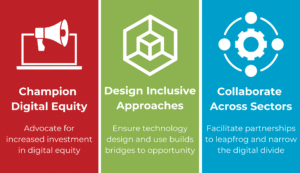Technology is built into nearly every aspect of our daily lives and how we learn and work. Inequitable access to technology and digital skills compounds existing inequities.
We are at a critical crossroads on our journey to build a resilient workforce, economic mobility, and social inclusion for all Americans. In our quest toward digital transformation in business, education, and basic services, we have further marginalized individuals who lack the access—and skills—to navigate an increasingly digital world. A third of all American workers aged 16–64 have limited or no digital skills (OECD), and digital divides continue to reflect existing inequities when analyzed by race or income (NTIA), exacerbating existing disparities (US Census Data).
This is especially acute in the world of work. Ninety-two percent of jobs now require digital skills (NSC), yet 73 percent of service sector workers lack the skills to solve problems in digital environments. Few receive training at work or can access opportunities outside of work to improve their digital skills and develop their digital resilience, or their confidence, agility, and capacity to learn to use new technologies (Digital US).
Building an Equitable Digital Ecosystem to Learn, Work, and Thrive
All of US must collaborate in unprecedented ways across the digital ecosystem to ensure it works for everyone. Our work aims to meet the main challenges and opportunities in advancing digital equity.
The three areas in which Digital US supports collaboration to build an equitable digital ecosystem are:

Join US to secure a more equitable digital future for all of US.
Local businesses, employers, healthcare providers, local government, service providers, schools, communities, and the environment